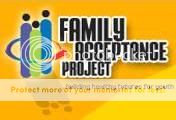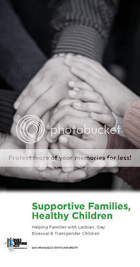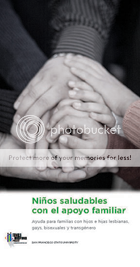 For the first time, researchers have established a clear link between accepting family attitudes and behaviors towards their lesbian, gay, bisexual and transgender (LGBT) children and significantly decreased risk and better overall health in adulthood. The study shows that specific parental and caregiver behaviors — such as advocating for their children when they are mistreated because of their LGBT identity or supporting their gender expression — protect against depression, substance abuse, suicidal thoughts and suicide attempts in early adulthood. In addition, LGBT youth with highly accepting families have significantly higher levels of self-esteem and social support in young adulthood.
For the first time, researchers have established a clear link between accepting family attitudes and behaviors towards their lesbian, gay, bisexual and transgender (LGBT) children and significantly decreased risk and better overall health in adulthood. The study shows that specific parental and caregiver behaviors — such as advocating for their children when they are mistreated because of their LGBT identity or supporting their gender expression — protect against depression, substance abuse, suicidal thoughts and suicide attempts in early adulthood. In addition, LGBT youth with highly accepting families have significantly higher levels of self-esteem and social support in young adulthood.
This may seem obvious to we LGBT folk, but as we know it is not necessarily obvious to parents, friends and other family members. For example, watch members of a California family describe their individual paths to understanding these truths in this amazing video.
Major research findings include:
* Family accepting behaviors towards LGBT youth during adolescence protect against suicide, depression and substance abuse.
* LGBT young adults who reported high levels of family acceptance during adolescence had significantly higher levels of self-esteem, social support and general health, compared to peers with low levels of family acceptance.
* LGBT young adults who reported low levels of family acceptance during adolescence were over three times more likely to have suicidal thoughts and to report suicide attempts, compared to those with high levels of family acceptance.
* High religious involvement in families was strongly associated with low acceptance of LGBT children.

 Results of the research are being translated into practical tools for parents by the study’s author Dr. Caitlin Ryan and her team at the Family Acceptance Project in collaboration with Child and Adolescent Services at the University of California, San Francisco, with funding from the Robert Wood Johnson Foundation. They use a behavioral approach to help ethnically and religiously diverse families decrease rejection and increase support for their LGBT children to reduce risk for suicide, depression, substance abuse, and HIV, to promote well-being and to prevent homelessness and placement in custodial care. This approach helps communities and providers to engage diverse families as allies in decreasing their LGBT children’s risk and increasing their well-being while respecting the family’s deeply held values. This work is being conducted in English, Spanish and Chinese with families from all ethnic backgrounds, including immigrant and very low income families, and those whose children are out-of-home in foster care and juvenile justice facilities.
Results of the research are being translated into practical tools for parents by the study’s author Dr. Caitlin Ryan and her team at the Family Acceptance Project in collaboration with Child and Adolescent Services at the University of California, San Francisco, with funding from the Robert Wood Johnson Foundation. They use a behavioral approach to help ethnically and religiously diverse families decrease rejection and increase support for their LGBT children to reduce risk for suicide, depression, substance abuse, and HIV, to promote well-being and to prevent homelessness and placement in custodial care. This approach helps communities and providers to engage diverse families as allies in decreasing their LGBT children’s risk and increasing their well-being while respecting the family’s deeply held values. This work is being conducted in English, Spanish and Chinese with families from all ethnic backgrounds, including immigrant and very low income families, and those whose children are out-of-home in foster care and juvenile justice facilities.
The study is published in the Journal of Child and Adolescent Psychiatric Nursing, a journal of the International Society of Psychiatric-Mental Health Nurses, in a peer-reviewed article titled “Family Acceptance in Adolescence and the Health of LGBT Young Adults.”
Pam’s House Blend – Front Page















